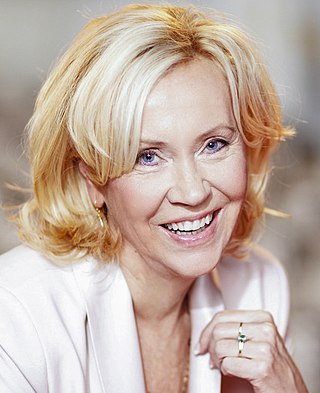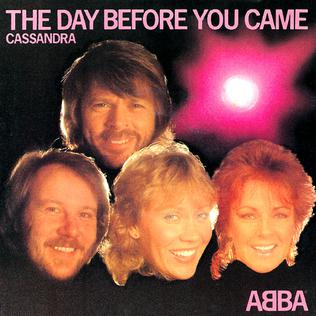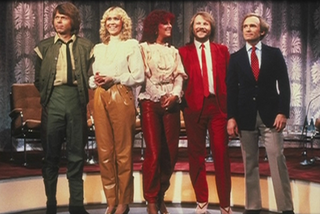Related Research Articles

Åse Agneta Fältskog, known as Agnetha Fältskog and AnnaFältskog, is a Swedish singer, songwriter and a member of the pop group ABBA. She first achieved success in Sweden with the release of her 1968 self-titled debut album. She rose to international stardom in the 1970s as a member of ABBA, which is one of the best-selling music acts in history. She is the youngest member of ABBA, and the only one born in the 1950s.

"The Day Before You Came" is a song recorded by Swedish pop group ABBA, released in October 1982 as the lead single from the compilation album The Singles: The First Ten Years.
"Intermezzo No. 1" is an instrumental track from Swedish pop group ABBA's self-titled third album, released in April 1975. It was the first of only two tracks by the group not to contain lyrics; the other was the title track of their 1976 release, Arrival. It is the only purely instrumental ABBA song however, as Arrival includes "a static layer of rich harmony vocals". On the cover, the song was credited as "Intermezzo No.1 featuring Benny Andersson".
"Dum Dum Diddle" is a song by ABBA, released on their 1976 album Arrival. In 1977 it was released as a promo single in Argentina on the RCA label.

"As Good as New" is a song recorded in 1979 by Swedish group ABBA, and was used as the opening track on their Voulez-Vous album. The lead vocals are by Agnetha Fältskog. The song was released as a single in Mexico as a double A-side with "I Have a Dream", where it became ABBA's ninth number-one hit. "As Good as New" was also released in Argentina and in Bolivia.
"When I Kissed the Teacher" is a song by the pop band ABBA. It is the opening track on their 1976 album Arrival.
"Me and I" is a song from ABBA's 1980 album Super Trouper. As with much of ABBA's 1980s output, the song features use of a synthesizer, and some have classified the song as synthpop. Anni-Frid Lyngstad handles the lead vocals.
"The Piper" is a track from the 1980 album Super Trouper, by Swedish pop group ABBA. The song is loosely based on the famous story of The Pied Piper of Hamelin, but lyricist Björn Ulvaeus cites the novel The Stand by Stephen King as a source of inspiration. It is regarded by some ABBA fans as being very different from the more mainstream songs they had recorded until this time. In particular, the dark lyrics dealing with the seduction by fascistic leaders and a somewhat medieval sound are not seen in their earlier songs. It is also the only ABBA song where a part of the refrain is in Latin, and has gained a small cult following among ABBA fans.
"I Saw It in the Mirror" is a song by Swedish pop band ABBA, released on their 1973 album Ring Ring.

Dick Cavett Meets ABBA is a 1981 television special featuring the Swedish pop group being interviewed by the American television personality Dick Cavett. ABBA also took to the stage, performing nine songs in a so-called "mini-concert". A one-off broadcast was filmed and produced by Sveriges Television (SVT) in Stockholm, Sweden and broadcast 12 September 1981 as "Dick Cavett Meets ABBA".
"Disillusion" is a ballad by the pop group ABBA, on their first album Ring Ring (1973). It is notable as the only song ABBA recorded and released on a studio album to have a songwriting credit from Agnetha Fältskog. She was a songwriter as well as a singer, and had dabbled in that in her pre-ABBA career. She wrote the music, with lyrics added by fellow ABBA member Björn Ulvaeus.
"The King Has Lost His Crown" is a song by Swedish group ABBA, released on their 1979 album Voulez-Vous. It was also the B-side of the non-album single "Gimme! Gimme! Gimme! ".
"Kisses of Fire" is a song recorded by Swedish pop group ABBA, released on their 1979 album Voulez-Vous.
"Should I Laugh or Cry" is a song by Swedish pop group ABBA, released as the B-side to the 1981 singles "One of Us" and "When All Is Said and Done" for the album The Visitors. Lead vocals were handled by Anni-Frid Lyngstad. It first appeared on the 1983 compilation album Thank You for the Music.
"Me and Bobby and Bobby's Brother" is a song by ABBA, released on their 1973 album Ring Ring.
"Two for the Price of One" is a song recorded by Swedish pop group ABBA, featured on their 1981 album The Visitors. The song also appears on the 1986 album ABBA Live.
"Tiger" is a song by the Swedish pop band ABBA. The song was released on the 1976 album Arrival.
"What About Livingstone?" is a song by ABBA, released on their 1974 album Waterloo.
"My Mama Said" is a song by ABBA, released on their 1974 album Waterloo. It was written by Benny Andersson and Björn Ulvaeus. The song was also released as the B-side to Honey, Honey in. Poland.
References
- 1 2 Tobler, John (2012-01-04). Abba - Uncensored on the Record. ISBN 9781908538239.
- ↑ Vincentelli, Elisabeth (2004-03-31). Abba's Abba Gold. ISBN 9780826415462.
- ↑ Tobler, John (2012-01-04). Abba - Uncensored on the Record. ISBN 9781908538239.
- ↑ Palm, Carl Magnus (2008-09-01). Bright Lights Dark Shadows: The Real Story of Abba. ISBN 9781847724199.
- ↑ "Google Translate" . Retrieved 2013-10-07.
- ↑ Megahey, Noel (2005-10-06). "Abba: The Movie | DVD Video Review | Film @ The Digital Fix". Film.thedigitalfix.com. Retrieved 2013-10-07.
- ↑ "Rock 'n' Roll".
- ↑ Palm; Hanser, Carl Magnus (2000-09-01). From Abba to Mamma Mia!: The Official Book. ISBN 9780823083176.
- ↑ Palm, Carl Magnus (2008-09-01). Bright Lights Dark Shadows: The Real Story of Abba. ISBN 9781847724199.
- ↑ Nielsen Business Media, Inc (1979-09-08). "Billboard".
{{cite journal}}:|last1=has generic name (help); Cite journal requires|journal=(help) - ↑ Vincentelli, Elisabeth (2004-03-31). Abba's Abba Gold. ISBN 9780826415462.
- ↑ "Los Angeles Times: Archives - Abba Takes a Chance on 'Album'". Pqasb.pqarchiver.com. 1978-02-07. Retrieved 2013-10-07.
- ↑ "The Sydney Morning Herald - Google News Archive Search".
- ↑ "Eugene Register-Guard - Google News Archive Search".